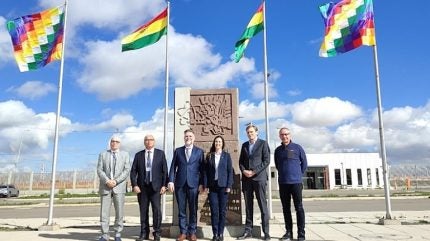
An International Atomic Energy Agency (IAEA) Integrated Safety Assessment Mission for Research Reactors (INSARR) team of experts says the Agency for Nuclear Energy of Bolivia (ABEN), operator of Bolivia’s first nuclear research reactor (RB‑01) currently under construction, has developed a management system in line with IAEA’s safety standards. The reactor is being built in El Alto, one of the highest cities in the world, at an altitude of more than 4000 metres. Once completed, it will be the highest nuclear reactor in the world.
The RB-1 (also known as the BRR-1) will produce radioisotopes for medicine, industry and science. It will enable the study of the chemical composition of materials using neutron activation analysis. The reactor will also be the basis for training students in nuclear specialties. The pool-type 200 kWt SM-3 high-precision research reactor was developed by specialists from Russia’s Research Institute for Atomic Reactors (NIIAR – part of Rosatom) in Dimitrovgrad. An upgraded core has been developed by NIIAR for the reactor, which will have a service life of 50 years. The reactor vessel was delivered from Russia and installed in its design position in 2023.
It is a key facility of Bolivia’s first research reactor complex and is the fourth phase of Centre for Nuclear Research & Technology (TsYaIT – Tsentra Yadernikh Центра Issledovanni i Teknologii), which is being built in El Alto by Rosatom specialists. The TVS VVR-M2 fuel, developed for the BRR-1 by Rosatom scientists, will be able to continue to operate during a maximum design earthquake of 8.7 points on the MSK-64 scale.
The contract for construction of the centre was signed in 2017 between JSC GSPI (State Specialised Design Institute, part of Rosatom) and ABEN. Construction of the facility began in July 2021, and it is expected to start up in July 2025. The reactor project has received site evaluation, construction and commissioning licences from the Bolivian regulator.
ABEN requested the IAEA review, which verified the safety of the research reactor project against IAEA safety standards. The seven-day mission covered organisational and management structure and reviewed technical areas, including safety analysis, construction and the commissioning programme. The INSARR mission team consisted of four experts from Bulgaria, Canada, France and the Netherlands, as well as one IAEA official.
The INSARR team visited the reactor and its associated facilities and met with the research reactor staff and management. “ABEN has made significant progress in construction and is building an effective organisation to begin commissioning, which will contribute to ensuring safety,” said review team leader Joseph Christensen, Senior Nuclear Safety Officer at the IAEA. “The review team encourages ABEN to continue keeping safety as the top priority as they proceed toward commissioning.”
The mission team also observed the organisation and cleanliness of the reactor construction site and made recommendations and suggestions to ABEN for improvements, including:
- Strengthening the on-the-job training of future operating staff of the reactor, including through active participation in commissioning tests, to ensure availability of qualified staff for safe operation;
- Formalising the safety committee to provide independent review and assessment of activities important to safety in the areas of commissioning and operation;
- Strengthening the supervision of construction and commissioning of the facility by ABEN, including review and assessment of design changes important to safety, non-conformances and verification of acceptance criteria for commissioning tests;
- Updating the radiation protection programme; and
- Establishing operational limits and conditions specific for commissioning.
“The Plurinational State of Bolivia decided to implement the Bolivian Nuclear Programme (PNB) with a clear understanding that the development of nuclear technology is only possible through a strict commitment to the safety culture,” said Hortensia Jiménez Rivera, Executive General Director of ABEN. “This ensures the successful implementation of the programme, allowing the population to benefit from its broad applications in health, industry, agriculture, the environment, water resources, mining, science and technology. In addition, the implementation of Bolivia’s first nuclear research reactor represents a turning point in the country’s scientific and technological development.”






